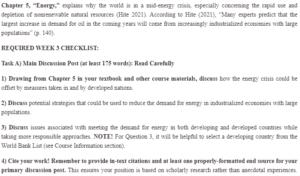Energy
Drawing from Chapter 5 in your textbook and other course materials, discuss how the energy crisis could be offset by measures taken in and by developed nations.
The energy crisis is a problem that is facing the whole world. Countries need strategies to offset this crisis. Hence, reduced reliance on nonrenewable resources and increased conservation measures are among the best ways to address the energy dilemma in affluent nations. However, there is also known technology that employs other sorts of renewable energies, such as steam, solar, and wind (Jaber, 2). Although the industrial era was primarily produced utilizing fossil fuels, coal usage will continue to harm the environment and deplete other natural resources during mining, necessitating its replacement as an energy source. Second, citizens in industrialized nations should switch to CFLs and LEDs in favor of conventional light bulbs. They last longer and consume fewer watts of power.
Discuss potential strategies that could be used to reduce the demand for energy in industrialized economies with large populations.
Enhancing energy efficiency is one strategy developed economies can utilize to lower energy demand. Energy efficiency is using less energy to accomplish the same task while avoiding high energy costs and needless emissions. Numerous items, houses, businesses, and industrial facilities use significantly more power than is necessary. To reduce emissions, use certified items to use less energy, minimize air pollution, and help manage the environment. The second recommendation is for industrialized nations to move to cleaner energy sources. Clean energy refers to energy produced utilizing renewable energy sources with no or minimal air emissions, such as solar and wind energy, and clean distributed generation, like combined heat and power. More and more individuals are buying renewable energy as the cost of wind and solar energy continues to drop (Cordero et al., 3). To save money, lessen their influence on the environment, and have more control over their energy use, many businesses also install renewable energy and combined heat and power in their buildings.
Discuss issues associated with meeting the demand for energy in both developing and developed countries while taking more responsible approaches. NOTE! For Question 3, it will be helpful to select a developing country from the World Bank List (see Course Information section).
In Iraq, frequent power outages are an everyday occurrence affecting all people. This problem will only worsen as time goes on because less electricity will be available to meet the state’s demand. The gap between the electricity the government provides and the electricity the Iraqi people need has already widened over the past five years; to date, Iraqi electricity consumption, which increased by almost 30% during this time, has outpaced the government’s efforts to satisfy soaring demand (Al-Saadi et al., 1). The disruptions also make it harder for the government to perform other essential public services, like operating hospitals, airports, and other government facilities that have been adversely affected. As a result, the Iraqi government should work to improve the situation by putting new ideas into practice and diversifying its energy sources. As a result of their expanded role in the expanding economies, developed nations like the US are having trouble supplying their energy needs. The need for goods, services, and travel increases the demand for fuel and power.
References
AL-Saadi, , Cherepovitsyn, A., & Semenova, T. (2022). Iraq Oil Industry Infrastructure Development in the Conditions of the Global Economy Turbulence. Energies (19961073), 15(17), 6239. https://doi.org/10.3390/en15176239
Jaber, (2021). A Surge toward a Sustainable Future: Organizational Change and Transformational Vision by an Oil and Gas Company. RAC – Revista de Administração Contemporânea, 25(3), 1–23. https://doi.org/10.1590/1982-7849rac2021200031.en
Sánchez Cordero, , Gómez Melgar, S., & Andújar Márquez, J. M. (2020). Green Building Rating Systems and the New Framework Level(s): A Critical Review of European Sustainability Certification. Energies (19961073), 13(1), 66. https://doi.org/10.3390/en13010066
ORDER A PLAGIARISM-FREE PAPER HERE
We’ll write everything from scratch
Question 
WEEK 3 DISCUSSION
Chapter 5, “Energy,” explains why the world is in a mid-energy crisis, especially concerning the rapid use and depletion of nonrenewable natural resources (Hite 2021). According to Hite (2021), “Many experts predict that the largest increase in demand for oil in the coming years will come from increasingly industrialized economies with large populations” (p. 140).

Energy
REQUIRED WEEK 3 CHECKLIST:
Task A) Main Discussion Post (at least 175 words): Read Carefully
1) Drawing from Chapter 5 in your textbook and other course materials, discuss how the energy crisis could be offset by measures taken in and by developed nations.
2) Discuss potential strategies that could be used to reduce the demand for energy in industrialized economies with large populations.
3) Discuss issues associated with meeting the demand for energy in both developing and developed countries while taking more responsible approaches. NOTE! For Question 3, it will be helpful to select a developing country from the World Bank List (see Course Information section).
4) Cite your work! Remember to provide in-text citations and at least one properly-formatted end source for your primary discussion post. This ensures your position is based on scholarly research rather than anecdotal experiences. NOTE! Remember, class, when you do not cite your work (i.e., fail to give credit to the author/s), it becomes an Academic Integrity violation, and your work will be referred to that office.
Task B) Student-to-Student Response: Review your classmates’ posts and respond to at least one other student. You should offer a substantive comment on that classmate’s position, including details, examples, and, if necessary, citations.